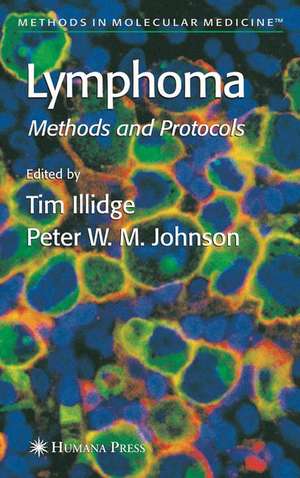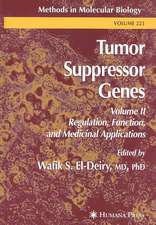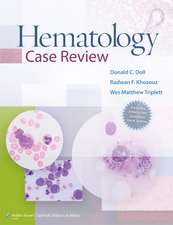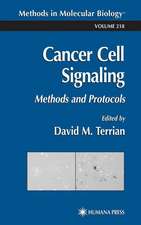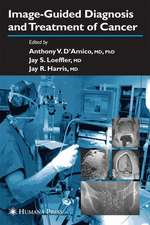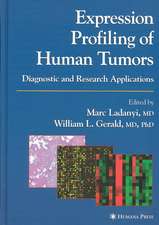Lymphoma: Methods in Molecular Medicine, cartea 115
Editat de Tim Illidge, Peter W. M. Johnsonen Limba Engleză Hardback – 17 mai 2005
| Toate formatele și edițiile | Preț | Express |
|---|---|---|
| Paperback (1) | 1098.63 lei 43-57 zile | |
| Humana Press Inc. – 10 noi 2010 | 1098.63 lei 43-57 zile | |
| Hardback (1) | 1106.13 lei 43-57 zile | |
| Humana Press Inc. – 17 mai 2005 | 1106.13 lei 43-57 zile |
Din seria Methods in Molecular Medicine
- 5%
 Preț: 1278.74 lei
Preț: 1278.74 lei - 15%
 Preț: 655.78 lei
Preț: 655.78 lei - 5%
 Preț: 1106.50 lei
Preț: 1106.50 lei - 5%
 Preț: 727.44 lei
Preț: 727.44 lei - 5%
 Preț: 1108.72 lei
Preț: 1108.72 lei - 15%
 Preț: 650.55 lei
Preț: 650.55 lei - 5%
 Preț: 735.66 lei
Preț: 735.66 lei - 18%
 Preț: 947.35 lei
Preț: 947.35 lei - 18%
 Preț: 948.92 lei
Preț: 948.92 lei - 5%
 Preț: 1114.54 lei
Preț: 1114.54 lei - 5%
 Preț: 1114.91 lei
Preț: 1114.91 lei - 15%
 Preț: 658.55 lei
Preț: 658.55 lei - 5%
 Preț: 734.01 lei
Preț: 734.01 lei - 5%
 Preț: 1111.61 lei
Preț: 1111.61 lei - 5%
 Preț: 1104.32 lei
Preț: 1104.32 lei - 5%
 Preț: 723.21 lei
Preț: 723.21 lei - 5%
 Preț: 723.05 lei
Preț: 723.05 lei - 5%
 Preț: 1108.35 lei
Preț: 1108.35 lei - 5%
 Preț: 723.42 lei
Preț: 723.42 lei - 5%
 Preț: 1115.65 lei
Preț: 1115.65 lei - 5%
 Preț: 786.86 lei
Preț: 786.86 lei - 5%
 Preț: 1133.01 lei
Preț: 1133.01 lei - 5%
 Preț: 1114.71 lei
Preț: 1114.71 lei
Preț: 1106.13 lei
Preț vechi: 1164.35 lei
-5% Nou
Puncte Express: 1659
Preț estimativ în valută:
211.66€ • 221.55$ • 176.17£
211.66€ • 221.55$ • 176.17£
Carte tipărită la comandă
Livrare economică 31 martie-14 aprilie
Preluare comenzi: 021 569.72.76
Specificații
ISBN-13: 9781588291592
ISBN-10: 1588291596
Pagini: 368
Ilustrații: XVIII, 342 p. 43 illus.
Dimensiuni: 155 x 235 x 28 mm
Greutate: 0.71 kg
Ediția:2005
Editura: Humana Press Inc.
Colecția Humana
Seria Methods in Molecular Medicine
Locul publicării:Totowa, NJ, United States
ISBN-10: 1588291596
Pagini: 368
Ilustrații: XVIII, 342 p. 43 illus.
Dimensiuni: 155 x 235 x 28 mm
Greutate: 0.71 kg
Ediția:2005
Editura: Humana Press Inc.
Colecția Humana
Seria Methods in Molecular Medicine
Locul publicării:Totowa, NJ, United States
Public țintă
Professional/practitionerCuprins
Purification of Primary Malignant B-Cells and Immunoblot Analysis of Bcl-2 Family Proteins.- Molecular Diagnosis of Lymphoma.- Demonstration of a Germinal Center Immunophenotype in Lymphomas by Immunocytochemistry and Flow Cytometry.- Karyotyping Lymph Node Biopsies in Non-Hodgkin’s Lymphoma.- Identification of Lymphoma-Associated Antigens Using SEREX.- Determining Mutational Status of Immunoglobulin V Genes in Chronic Lymphocytic Leukemia.- Idiotype Gene Rescue in Follicular Lymphoma.- Immunoglobulin Gene Mutation Patterns and Heterogeneity of Marginal Zone Lymphoma.- T-Cell Receptor Molecular Diagnosis of T-Cell Lymphoma.- Cloning of Immunoglobulin Chromosomal Translocations by Long-Distance Inverse Polymerase Chain Reaction.- Sequential Fluorescence In Situ Hybridization Analysis for Trisomy 12 in B-Cell Chronic Lymphocytic Leukemia.- Splenic Marginal Zone Lymphoma.- BCL-6.- Antibody Techniques Used in the Study of Anaplastic Lymphoma Kinase-Positive ALCL.- Identification of Anaplastic Lymphoma Kinase Variant Translocations Using 5?RACE.- Follicular Lymphoma.
Recenzii
"Offers(s) a diverse collection of readily reproducible techniques for the molecular diagnosis and prognostic evaluation of lymphomas..." - Clinical Laboratory International
Textul de pe ultima copertă
The tremendous progress made over the last few years in our molecular understanding of lymphocyte biology and lymphoma classification promises to have a major impact on clinical practice. In Lymphoma: Methods and Protocols, leading clinical investigators from world renowned laboratories describe in step-by-step detail the latest molecular techniques being used to better understand, classify, and treat lymphoma. Among the highlights are methods to use immunoglobulin gene rearrangements as markers of clonality, to exploit patterns of somatic mutation in the variable regions to indicate at which stage transformation occurred, and to apply gene arrays to the question of biological heterogeneity in morphologically similar diseases. Research methodologies that are highly likely to become routine practice in the future, such as DNA microarray and immunoglobulin V-gene rearrangements, and measurement of minimal disease, are included. There are also molecular techniques for producing novel therapeutics, such as a DNA vaccine with patient-specific sequences derived from the lymphoma in question. The protocols follow the successful Methods in Molecular Medicine™ series format, each offering step-by-step laboratory instructions, an introduction outlining the principle behind the technique, lists of the necessary equipment and reagents, and tips on troubleshooting and avoiding known pitfalls.
Cutting-edge and highly practical, Lymphoma: Methods and Protocols offers oncologists, hematologists, and clinical scientists a diverse collection of readily reproducible techniques for the molecular diagnosis and prognostic evaluation of lymphomas.
Cutting-edge and highly practical, Lymphoma: Methods and Protocols offers oncologists, hematologists, and clinical scientists a diverse collection of readily reproducible techniques for the molecular diagnosis and prognostic evaluation of lymphomas.
Caracteristici
Includes supplementary material: sn.pub/extras
